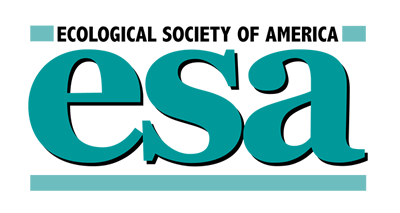Education and Diversity Programs
ESA develops strategic programs to increase diversity within ecology-related professions and to improve the quality of ecology education at all levels. Ecology is a diverse science for diverse people. Broadening participation strengthens our science and its impact. ESA welcomes and encourages all people to fully participate in the science of ecology.
Fostering Careers and Professional Development for the Next Generation
Undergraduate audience: (RCN-UBE)
Next Generation Careers Innovation in Environmental Biology Incubator
Next Generation Careers – Innovation in Environmental Biology Education was created with NSF support (Award # DBI-1539911) to develop a new network to support workforce development for college graduate career progression into environmental biology. This project’s team completed a job ad scan, faculty survey, and eight focus group sessions at professional society meetings– including one held in the ESA Washington, DC office with multiple professional society representatives.
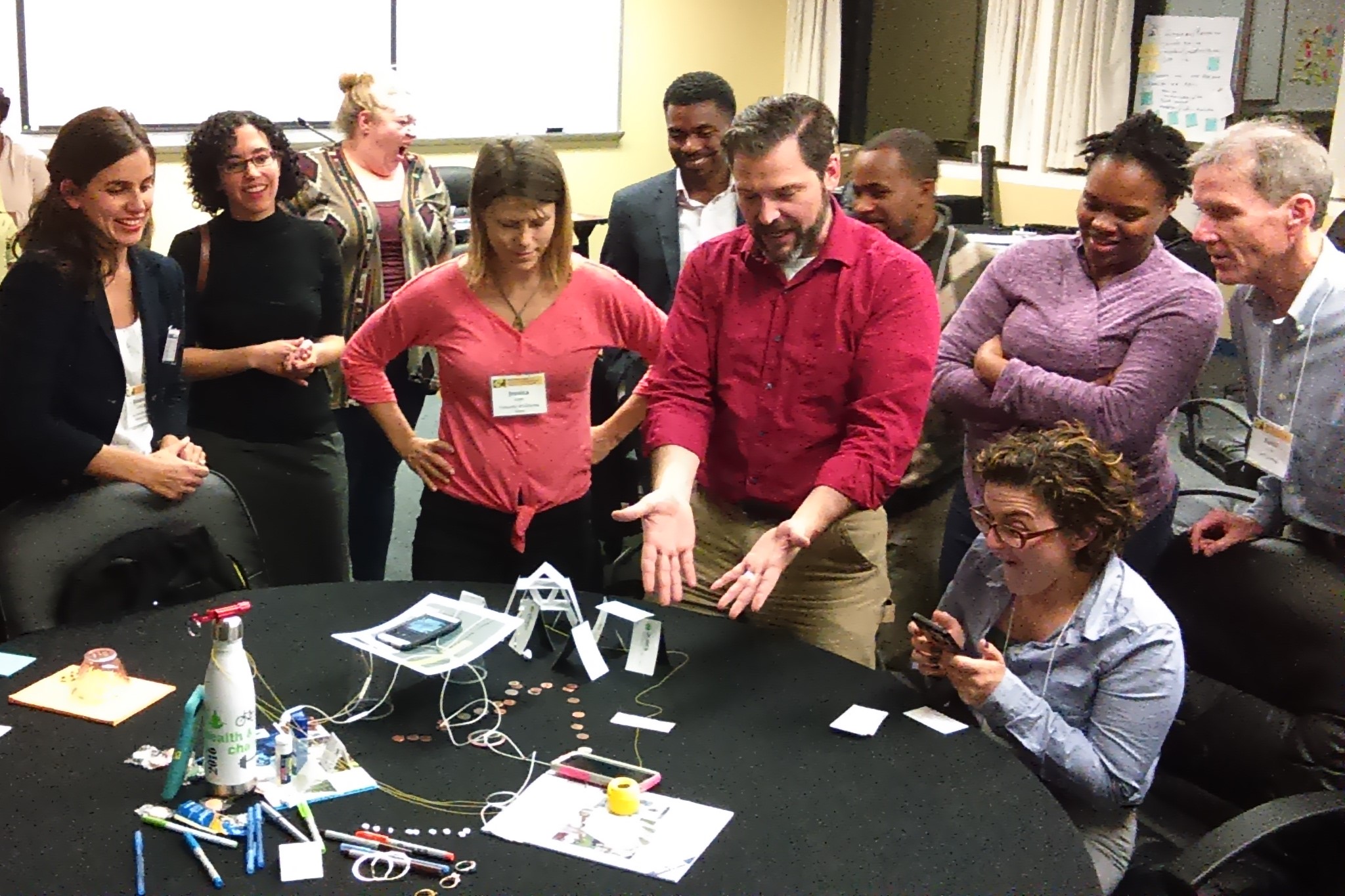
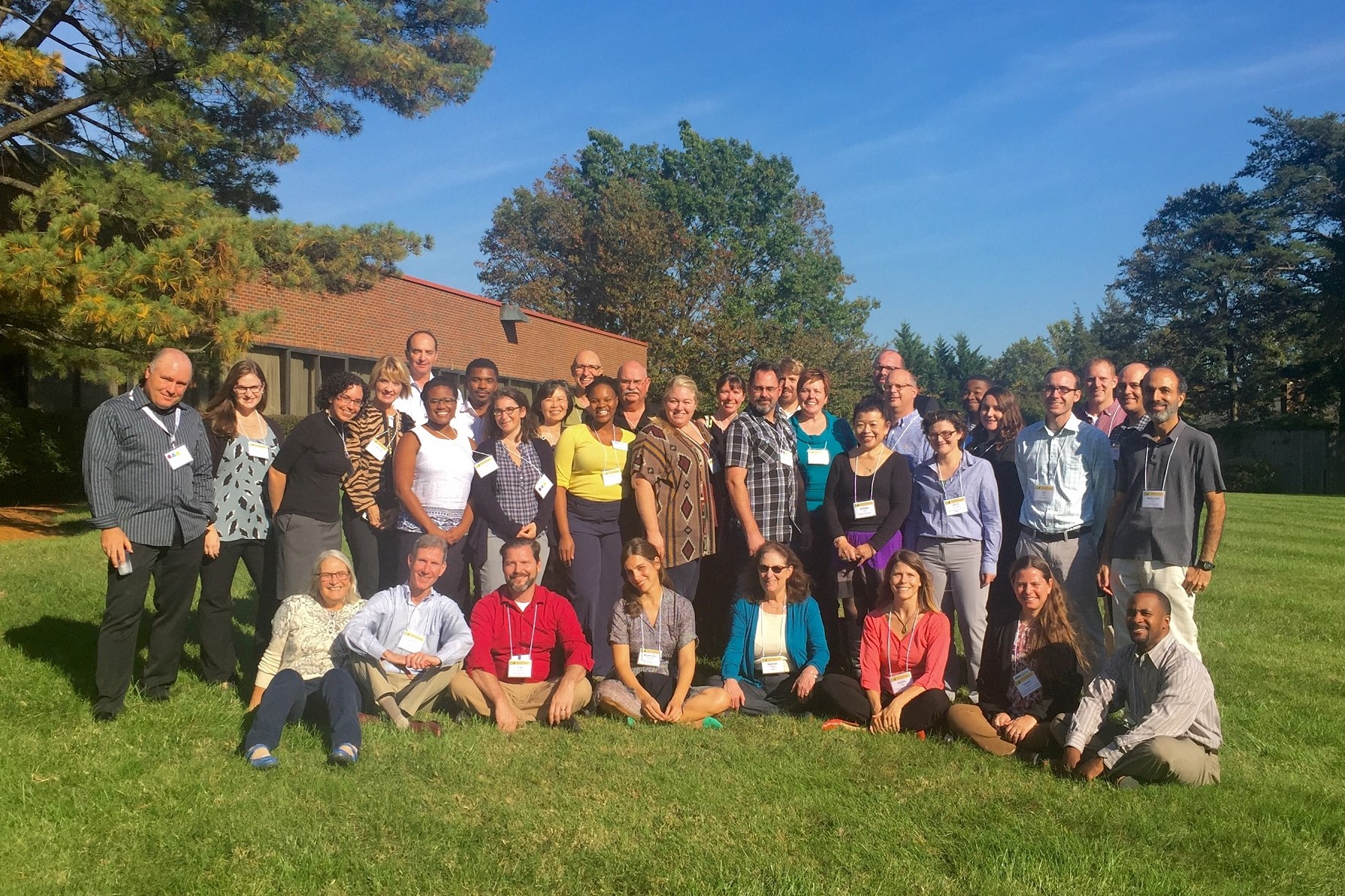
ESA staff and partners held a workshop from October 17-19, 2016 in Baltimore, MD (pictured above) with 36 participants from many sectors including academia, business, nonprofits, agencies, and professional societies. This activity highlighted the need to increase awareness of and access to career opportunities, tap alumni networks, enhance career building activities into undergraduate curriculum/experience, and increase the visibility and value of environmental biology careers.
Environmental Biology Careers for the Next Generation Reception and Forum
At the 2017 Annual Meeting, a forum of public and private sector participants was organized to share the findings of network activities. The event drew 75 participants. Participants overwhelmingly emphasized greater interactions between students, faculty, and professionals through mentoring, shadowing and networking in order to nurture the necessary knowledge of real-world expectations of future ecologists. A poster on “What’s Essential in Preparing Undergrads for Environmental Biology Careers?” highlighting the project findings was also presented.
Facilitating Data-Intensive Ecology Education
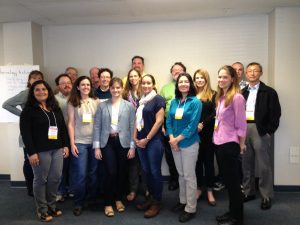
Since 2008, ESA’s office of Education and Diversity Programs has been engaged in promoting data-intensive approaches to ecological education. These initiatives are intended to prepare the education community for the anticipated outputs of the National Ecological Observatory Network. In 2016, we are delighted to partner with QUBES, which is an NSF-funded virtual center that supports collaboration to promote quantitative biology education at the undergraduate level.
In line with this effort, ESA recognized 23 faculty who participated in the first ESA-QUBES Faculty Mentoring Network as ESA Education Scholars. Scholars implemented modules from selected Teaching Issues and Experiments in Ecology (TIEE), ESA’s education journal. Faculty represented a diversity of institutional settings, teaching philosophy and data, online and teaching experience (ranging from 1-2 yrs to more than 20 yrs). More than 80% came from primarily undergraduate institutions, six from community colleges, and nine from historically black or minority-serving institutions.
Based on the success of the initiative, ESA continued to partner with QUBES to offer two additional faculty mentoring networks in the Spring of 2017.
Fostering Effective Ecology Education at the 2017 ESA Annual Meeting
Resources for Ecology Education – Fair and Share (REEFS)
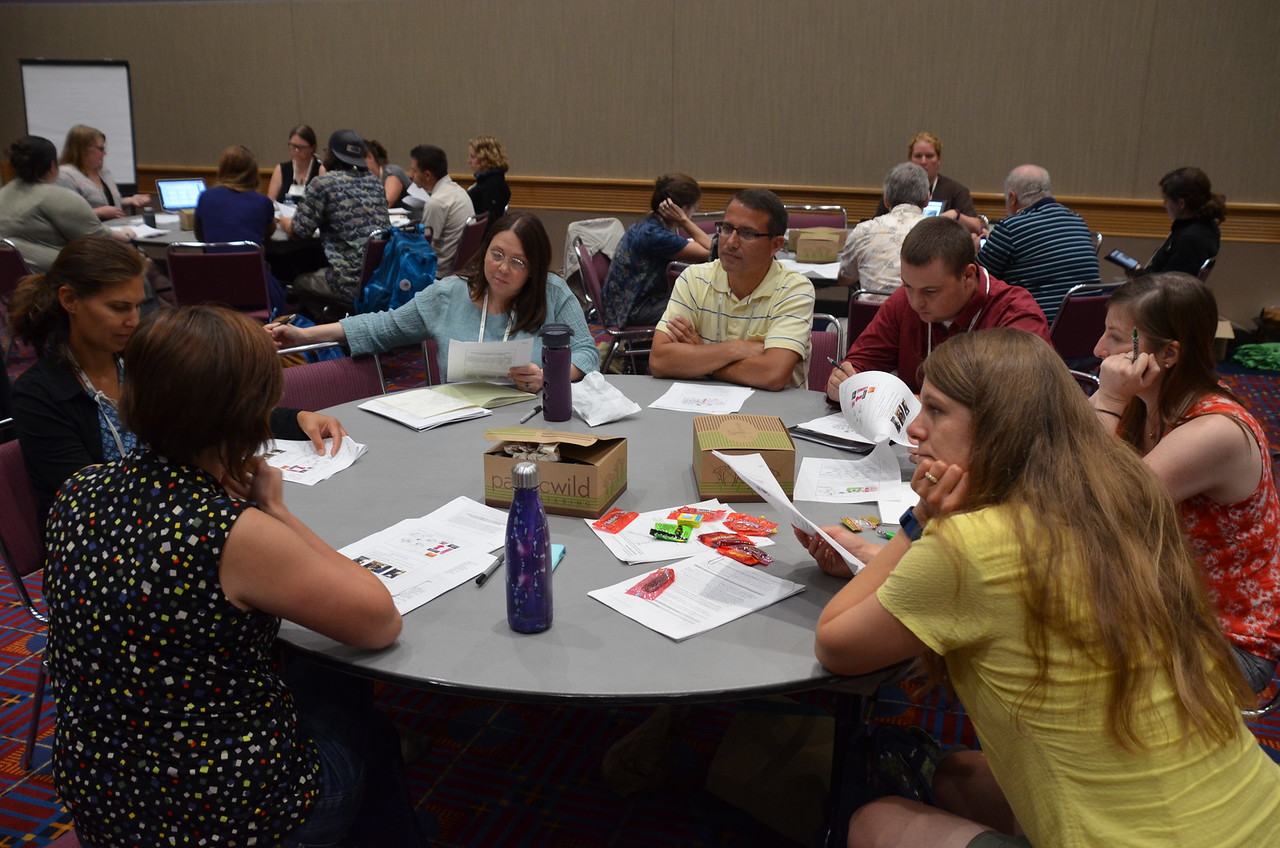 The 9th Resources for Ecology Education – Fair and Share (REEFS) was offered as a half-day preconference workshop for the second time and drew 28 participants. Co-organized by the ESA Office of Education & Diversity Programs and the ESA Education Section, the workshop featured keynote speaker, Dr. Diane Ebert-May, who shared insights on ways to authentically assess learning based on intended learning outcomes. This unique workshop with roundtable discussions is designed to foster exchange of teaching ideas. 94% of participants agreed that they gained new ideas on how to adapt classroom activities to their specific learning environment. Half of the participants plan to submit their teaching resources to ESA’s EcoEd Digital Library (EcoEdDL).
The 9th Resources for Ecology Education – Fair and Share (REEFS) was offered as a half-day preconference workshop for the second time and drew 28 participants. Co-organized by the ESA Office of Education & Diversity Programs and the ESA Education Section, the workshop featured keynote speaker, Dr. Diane Ebert-May, who shared insights on ways to authentically assess learning based on intended learning outcomes. This unique workshop with roundtable discussions is designed to foster exchange of teaching ideas. 94% of participants agreed that they gained new ideas on how to adapt classroom activities to their specific learning environment. Half of the participants plan to submit their teaching resources to ESA’s EcoEd Digital Library (EcoEdDL).
Four Dimensional Ecology Education (4DEE) Framework
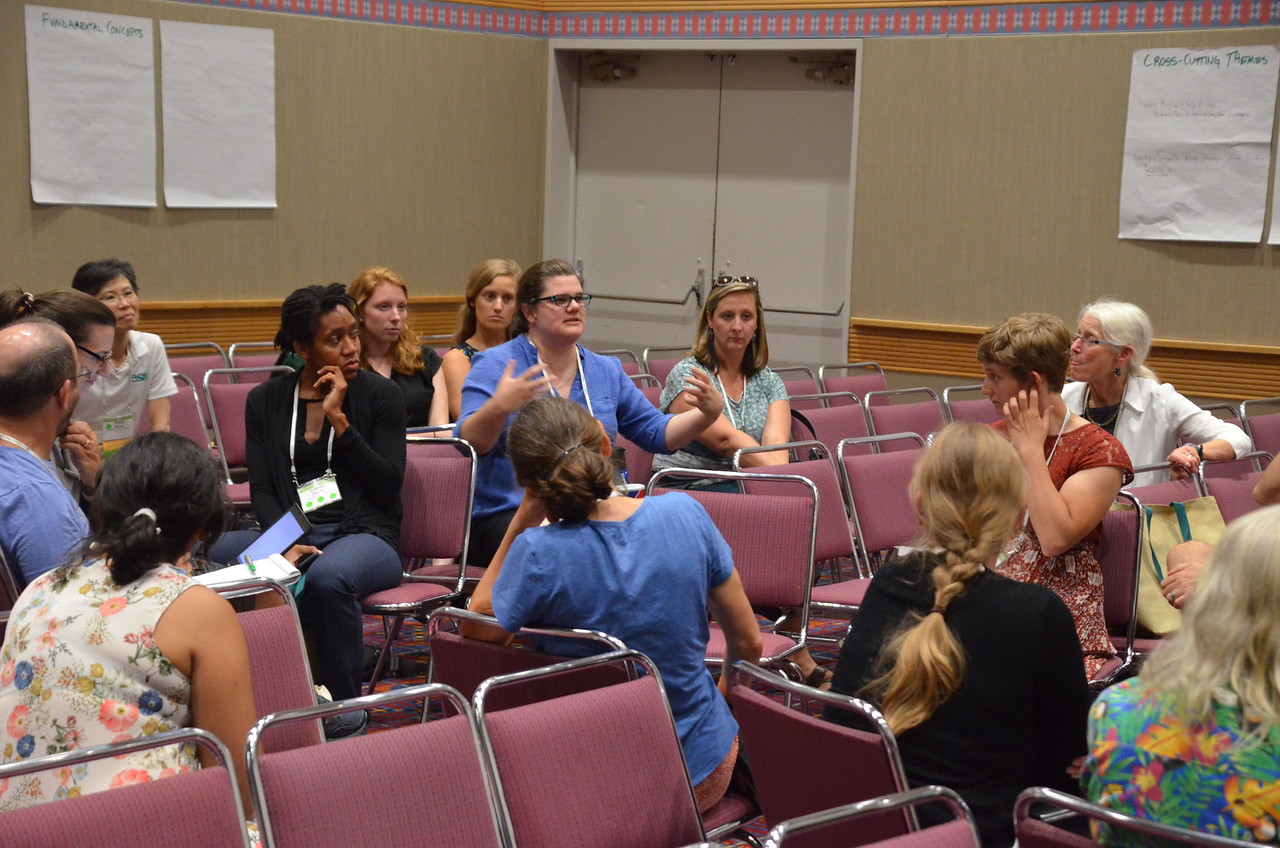 The third Special Session in a series to gather input, Implementing ESA’s 4DEE Framework to Transform Your Undergraduate Ecology Course generated ideas that help faculty teach using the newly developed four-dimensional ecology education framework (4DEE). The 4DEE Framework includes core ecology concepts, integrates humans throughout the ecology curriculum, showcases how the core ecology concepts are connected with important biological themes, and provides guidance on the science practices that we want all ecologists to have after exposure to a college level ecology education. This initiative furthers the strategic plan of the ESA Committee for Diversity and Education.
The third Special Session in a series to gather input, Implementing ESA’s 4DEE Framework to Transform Your Undergraduate Ecology Course generated ideas that help faculty teach using the newly developed four-dimensional ecology education framework (4DEE). The 4DEE Framework includes core ecology concepts, integrates humans throughout the ecology curriculum, showcases how the core ecology concepts are connected with important biological themes, and provides guidance on the science practices that we want all ecologists to have after exposure to a college level ecology education. This initiative furthers the strategic plan of the ESA Committee for Diversity and Education.
Expanding the Field of Ecology
SEEDS
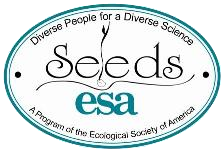 The Presidential Award-winning ESA SEEDS program – Strategies for Ecology Education, Diversity and Sustainability is at the forefront of diversity in science. Founded in 1996 the program mission is to diversify and advance the ecology profession through opportunities that stimulate and nurture the interest of underrepresented students to participate, and to lead in ecology. This past year alone SEEDS directly served over 100 students from all across the US, Puetro Rico and Guam!
The Presidential Award-winning ESA SEEDS program – Strategies for Ecology Education, Diversity and Sustainability is at the forefront of diversity in science. Founded in 1996 the program mission is to diversify and advance the ecology profession through opportunities that stimulate and nurture the interest of underrepresented students to participate, and to lead in ecology. This past year alone SEEDS directly served over 100 students from all across the US, Puetro Rico and Guam!
SEEDS Partnerships for Undergraduate Research (SPUR) Fellowship
The SPUR Fellowship program, with funding from the NSF and our partners, supports undergraduate students in conducting an independent ecological investigation with guidance from a mentor scientist. As part of the program, students participated in the 2017 SEEDS Leadership Meeting and will present their research at the 2018 ESA Annual Meeting in New Orleans, LA. Here are the students, home institutions and the partnership sites where they did their summer research projects:
- Maria Siles Asaff (University of Texas at El Paso) – Llano River Field Station
- Nana Britwum (Cornell University) – M.K. Kellogg Biological Station
- Jerilyn Calaor (University of Guam) – Harvard Forest LTER
- Mikayla Domingo (Oregon State University) – Cary Institute of Ecosystems Studies
- Clint Fallon (Colorado State University) – Llano River Field Station
- Leandra Gonzalez (Florida International University) – Rocky Mountain Biological Laboratory
- Robert Moakley (Rochester Institute of Technology) – Central Arizona Phoenix LTER
SEEDS Field Trips
Ecology field trips are the cornerstone for freshman and sophomore students to learn about ecology first-hand. Students spend four to seven days at an ecologically significant site, such as a field station, research laboratory, or national park, learning about the science of ecology, exploring career options, and seeing the practical applications of ecology. Students find out more about what ecologists do through hands-on experiences with professionals, receive training in specific areas, and build networks with students and professionals.
Whitney Lab for Marine BioScience – SEEDS Regional Field Trip
November 3-6, 2016

From Nov 3-6, 2016, 17 students from five institutions participated in a regional field trip to the Whitney Lab for Marine BioScience in St. Augustine and the Guana-Tolomato-Matanzas National Estuarine Research Reserve in Ponte Vendra, FL. Students came from Bethune-Cookman University, Florida A&M University, Florida Atlantic University, Florida International University and University of Florida. Additionally, two SEEDS graduate student alumni and FAMU faculty adviser, Dr. Richard Gragg also participated. Students had an amazing experience learning about the oysters, the shore birds and the benthic diversity at Whitney Lab. Next, everyone then waded into the salt marshes to harvest Spartina that is being used to in restoration efforts to stem shoreline erosion. We are grateful to Andrea and Brandon Noel for pulling together the field trip program. Partial support for this field trip came from The Curtis & Edith Munson Foundation.
Flathead Lake Biological Station – SEEDS National Field Trip
September 29 – October 2, 2016

We hosted a National Field Trip to Flathead Lake Biological Station, managed by the University of Montana in Polson, Montana from September 29 – October 2, 2016. SEEDS sponsored 18 undergraduate and one SEEDS alumni to participate in this unique opportunity. With the help from Jim and Monica Elser, and the rest of the FLBS staff, students learned about the science fields of limnology and ecology. They participated in field research exercises collecting zooplankton samples at the lake and learned about the vertical migration of these organisms. They also had the opportunity to visit Glacier National Park where they learned about the glacier waters and the rapidly changing environment due to climate change.
Supported by the National Science Foundation.
SEEDS at the ESA Annual Meeting
Portland, Oregon
August 6-11, 2017

At the 102nd ESA Annual Meeting in Portland, Oregon the SEEDS Program once again partnered with the Doris Duke Conservation Scholars Program (DDCSP) to bring 49 undergraduate students to the ESA Annual Meeting. We are very proud to have a diverse group of students this year:
- 35 female and 14 male students
- 23 Hispanic/Latino, 8 Black, 12 White, 3 Asian, 3 Mixed Race undergraduate students.
- Students from 17 states and 27 different institutions
- 86% of students presented their own research at ESA
A huge thank you to all of the ESA members that served as SEEDS Student Mentors and our six SEEDS Alumni Graduate Award Recipients for taking the time to mentor our students. We also thank the universities and programs that participated in this year’s Diversity in Ecology, Grad School and Careers Fair at the Diversity Luncheon. During the Diversity Luncheon, SEEDS staff facilitated the recognition of the 2016-2017 SEEDS SPUR Fellows: Roxanne Hoorn, Maggie Yarnold, Rebekah Sanchez, Michelle Poletti, Nikita Kowal, Chelsea Hazlett and Kathryn Bloodworth. They received their certificates from ESA President David Lodge, Vice President Nalini Nadkarni, Executive Director Katherine McCarter, and Education and Diversity Program Director Teresa Mourad.
SEEDS Leadership Meeting
El Yunque National Forest, Puerto Rico
12th Leadership Meeting, April 5-9, 2017


We hosted the 2017 SEEDS Leadership Meeting at El Yunque National Forest in Rio Grande, PR. 23 students from all over the US participated in this meeting that focused on the connections between forests and communities. We stayed at El Verde Field Station managed by the University of Puerto Rico and the Luquillo LTER where students were nestled in the middle of the tropical forest. Participants also conducted a citizen science project at Las Cabezas de San Juan Nature Reserve managed by a local non-profit conservation trust called Para La Naturaleza, there they removed green iguana nests (an invasive species) from critical coastal habitat. They conducted visitor surveys at El Yunque National Forest – the only tropical rain forest in the USDA Forest Service system – and learned about the unique management strategies that take place at El Yunque.
The support for this program came from the USDA Forest Service.
On September 20, 2017 the island of Puerto Rico was devastated by Hurricane Maria. Both El Yunque National Forest and Las Cabezas de San Juan Nature Reserve suffered severe damages due to the over 200mph wind gusts and 24 inches of rain. Many of our colleagues and students in Puerto Rico endured one of the strongest storms in recorded history and power and water is still not restored to most of the island. The SEEDS program will be working directly with our students and alumni to help in the recovery efforts of five SEEDS Chapters in Puerto Rico. You can help by donating to SEEDS.
Education & Diversity Programs Office Staff
Director: Teresa Mourad
Diversity Programs Manager: Fred Abbott
Interns, Summer 2016: Phoo Chit and Victor Chan
Intern, Summer 2017: Sayd Hussain
Committee for Diversity and Education
(August 2016 – August 2017)
Vice President of Education and Human Resources: Nalini Nadkarni
Betsy Bancroft
Brenda Bergman
Kim Bjorgo-Thorne
Candace Galen
Aurora MacRae-Crerar
George Middendorf
Tim Nuttle
Josh Scholl
Jo Varner
